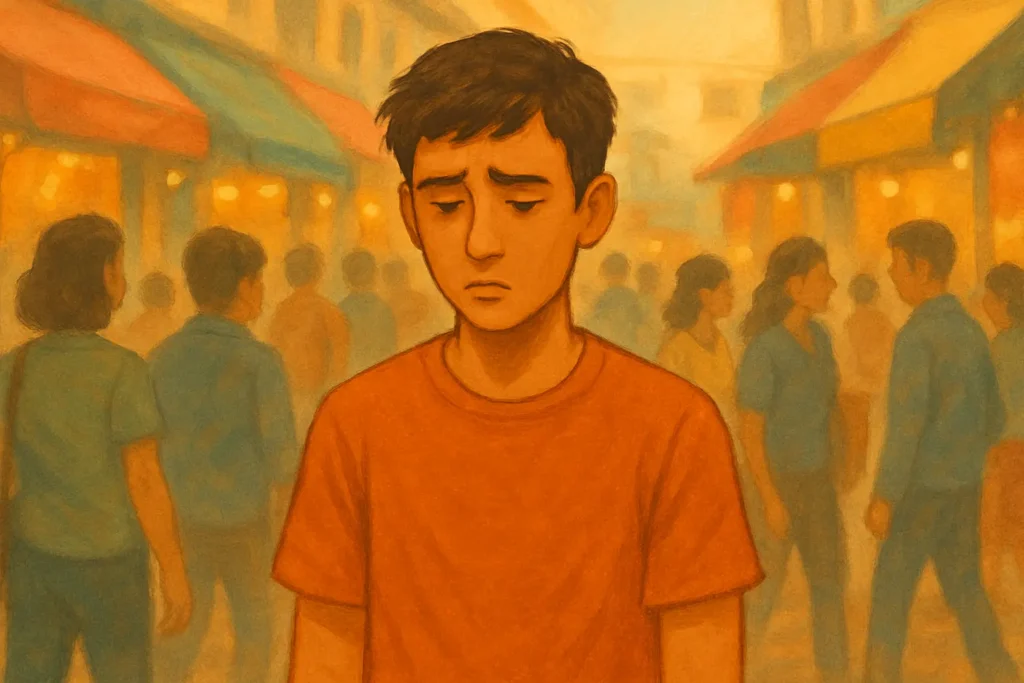In a country full of people, how can anyone feel alone? And yet, male loneliness in India is quietly growing. Across cities and small towns, many Indian men are struggling with a kind of isolation they don’t know how to name. It’s not peaceful solitude, it’s the heavy kind. The kind that sits quietly in the room with you. The kind you don’t talk about because no one taught you how.
What Male Loneliness in India Looks Like Today
It often doesn’t look like loneliness at all.
Maybe it’s the man who’s always joking in the office WhatsApp group but hasn’t shared anything real in months.
Or your father, who worked hard every day and never once said he was overwhelmed.
Sometimes it’s a 22-year-old scrolling through reels at 2 a.m., not because he’s entertained—but because he feels empty.
Or someone who never learned how to talk about what he’s feeling.
From a young age, boys in India are told to be strong. Don’t cry. Don’t complain. Mard ko dard nahi hota. Over time, they learn to keep things in, even when it hurts.
Why Indian Men Feel Lonely
Indian society often teaches men that emotions are a weakness. Friendships in school or college may fade once jobs and families take over. Romance is often controlled by family approval. And by their 30s or 40s, many men realise they don’t have anyone they can really talk to.
Add to this:
- Pressure to earn and “provide”
- Lack of emotional education
- Social stigma around asking for help
…and you get men who are deeply isolated but unable to say it out loud.
How Loneliness Among Indian Men Affects Daily Life
- In mental health: According to this Lancet study on suicide in India, suicide is the leading cause of death among Indian men aged 15–39. Men are more than twice as likely to die by suicide than women in India.
- In friendships: Many married or working men report having no close friends.
- In old age: After retirement or losing a spouse, many older men struggle with deep emotional isolation.
But most of this stays hidden. Because talking about it? That’s not something men are “supposed” to do.
“I Don’t Even Know What I’m Feeling”
In therapy rooms across India, male clients often say some version of this. Many have never used words like “hurt,” “anxious,” or “lonely” before. No one ever asked them how they were really feeling. And even if they wanted to talk—they wouldn’t know where to begin.
Loneliness shows up as anger. As silence. As drinking alone at night. Or getting lost in hours of watching videos or shows just to feel less alone, or just … numbness.
How to Address the Male Loneliness Epidemic in India
1. Change what it means to be “a man”
Strength isn’t about holding it all in. It takes more courage to say “I’m not okay” than to pretend everything’s fine.
2. Make space for real friendships
Men need friends they can talk to—not just about cricket or movies, but about fear, stress, and grief. Not just “yaar” energy—but real emotional connection.
3. Talk more, even at home
If boys see their fathers, brothers, or uncles talk about feelings, they’ll grow up knowing it’s okay to do the same.
4. Make therapy feel normal
Therapy in India still feels like a last resort. But what if it became something men did just to understand themselves better? What if saying “I see a therapist” was as common as saying “I go to the gym”?
5. Don’t fix—just listen
Sometimes, men don’t need solutions. They just need someone to sit with them and say, “It’s okay. I hear you.”
This Isn’t Just About Men
When men are lonely, it affects families, relationships, and communities. Emotionally shut-off fathers or partners aren’t just sad—they’re deeply hurting and unable to express it. And the cost is paid by everyone around them.
Loneliness isn’t weakness. It’s a sign that something deeply human is missing. And fixing it isn’t about teaching men to be “more emotional”—it’s about giving them permission to be human.
A Quiet Change Is Happening
Some men are beginning to talk. Safe spaces are growing. Support groups are forming. Young men are choosing a different path—not of silence, but of openness.
And if you’re reading this and you feel alone, just know—you’re not the only one. There are so many others like you. You may not see them yet. But they’re out there. And maybe they’re waiting for someone else to go first.
Loneliness doesn’t mean something is wrong with you. It means you’re alive, in a world that has forgotten how much people need people.


